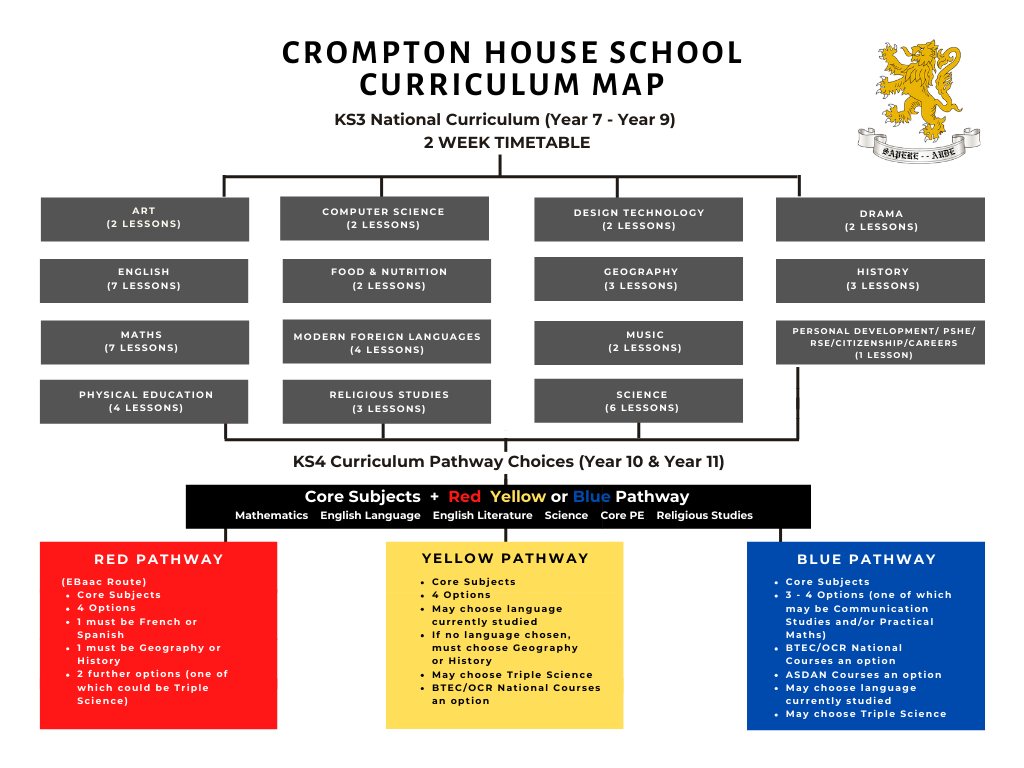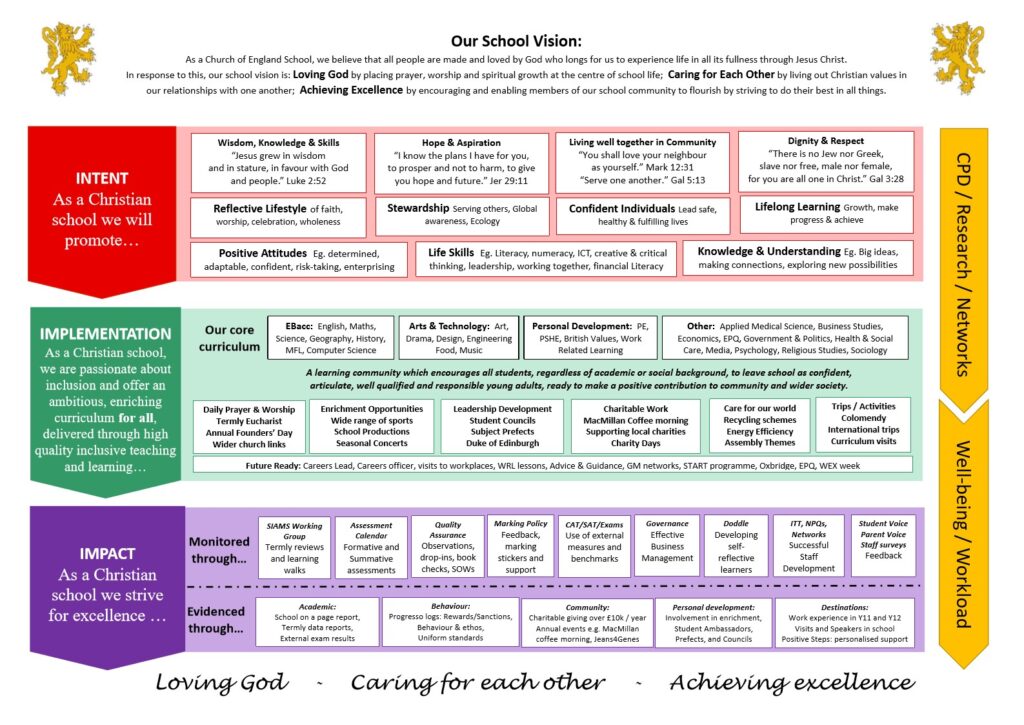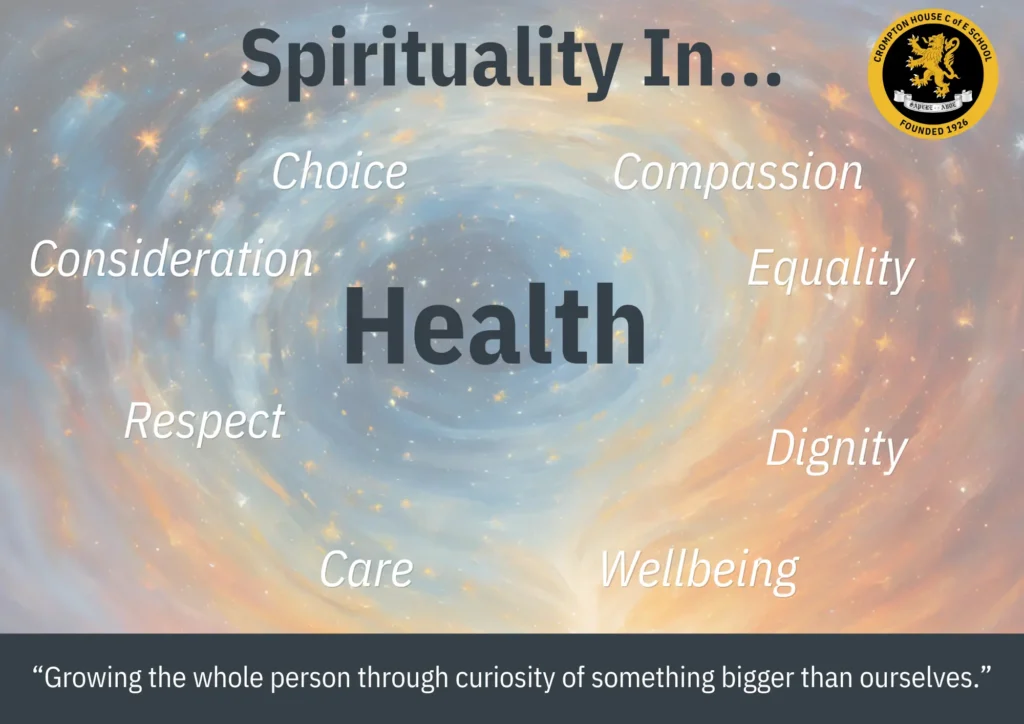Health and Social Care
At Crompton House we aim to create the very best Health and Social Care students. We know that many of our Health and Social Care students aim to work within the fields of health care, education, and social care; therefore, the aim of our curriculum is to equip students with the appropriate knowledge and skills needed to be able to work within a multi-agency team and understand the importance of good quality care. We do this using quality first teaching to ensure students understand underlying Health and Social Care principles and can apply them in a variety of familiar and unfamiliar contexts. Our students are guided to think holistically about the concepts of ‘health’ and ‘wellbeing’ and draw conclusions about the impact of factors which can impact development.
Our curriculum goes beyond what is taught in lessons, for whilst we want students to achieve the very best examination results possible, we believe our Health and Social Care curriculum goes beyond what is examinable.
Our curriculum in Health and Social Care supports the ethos of the school. Students are constantly challenged to work collaboratively and think independently when engaging in all lessons and class debates. Through teacher modelling, we encourage students to demonstrate manners, respect and tolerance in all Health and Social Care lessons. This allows students to express themselves in a confident manner. Lesson materials are engaging to promote topical discussion and encourage students to develop an enquiring mind.
We believe that knowledge underpins and enables the application of skills; both are entwined. Content is delivered to students and then built upon through a variety of practice questions, with regular quality feedback being given to support student progress. The knowledge acquired then allows students to develop their analytical and critical thinking skills.
Cultural Capital is embedded throughout the Health and Social Care curriculum. Our students are introduced to a wide variety of viewpoints from some of the most influential researchers throughout history such as Piaget, Bowlby, Ainsworth and Gesell. Students study the impact that their work has had on the care we provide for service users, and students are encouraged to make links between their theories and real – life examples. Students are expected to think analytically, to understand how factors interrelate to impact physical and/or mental wellbeing.
In addition to our aims, our curriculum design includes revisiting and building on existing knowledge using metacognition tasks. We ensure the level of challenge is high enough for the most able, with scaffold and support available for students who need it.
Is there a vision for Health and Social Care and how does it reflect and support the school context?
‘Caring for Each Other’ is a guiding principle at Crompton House School; this is reflected and support in our vision for Health and Social Care, as we encourage students to think deeply about what it means to ‘care’ for a person as a professional or informal care worker. We explore care as a skill and students must evaluate how well this skill has been executed in a variety of case studies.
How clearly are the expectations and goals built into the curriculum?
Each module in all of Health and Social Care carries its own objectives and aims as laid out in the Scheme of Work and/or Assessment Criteria (if it is an internally assessed unit). These aims are conveyed to students within each unit so that they can see the end intentions of their learning.
How has curriculum content been selected and how does this reflect the vision?
Key stage 5 content in Health and Social Care has been determined by the Edexcel/Pearson exam board which is used across the department.
This specification allows students to explore Health and Social Care as a BTEC alongside other A-Level subjects- providing them with flexibility when looking at their career and further education aspirations.
How does the curriculum develop understanding about key Health and Social Care concepts?
Health and Social Care is a new subject never studied before (except GCSE for some external candidates), and our first unit in Year 12 gives an overall understanding of ‘typical’ human development (from Infancy to Later Adulthood), as well as factors which impact this development process. This background is necessary for later modules, which focus on case studies who have been impacted by a variety of factors and students must draw conclusions concerning their care.
Collaborative, detailed and thorough curriculum planning lies at the heart of this department. We use all available resources and teaching strategies to ensure that students have a comprehensive knowledge of the specifications and are capable of going beyond what is taught in lessons. Techniques to help develop long-term memory and help students master subject content are embedded in the curriculum. These are focused on embedding challenge, metacognition, memory techniques, numeracy and literacy into our departmental curriculum.
In Health and Social Care we also implement our curriculum through using a variety of teaching strategies and kinaesthetic tasks as well as more traditional skills practice.
How good is teachers’ knowledge and knowledge of how Health and Social Care is taught and learned?
Teacher knowledge is excellent; timetable usually allows for Level 3 BTEC subjects to be taught by subject specialists with experience in their subject areas. The department contains teachers with several years’ experience in teaching all three A levels on offer in the Social Sciences. This is evidenced from lesson observations, lesson planning and by action in the classroom. Teachers who are new to the specification are fully supported with resources and time for moderation.
The Lead IV ensures that the OSCA materials are reviewed during the OSCA window each academic year.
How well does teaching embed secure understanding and how does assessment support this?
Teaching & assessment at key stage 5 is focused on the examination requirements set by Pearson Edexcel, for example by embedding routine opportunities for exam practice and paragraph writing. Teaching activities promote metacognitive strategies and there are opportunities during each half term for summative assessment (see assessment policy). Internally assessed modules are taught using practice scenarios to allow students to become comfortable with their knowledge before beginning their assessed piece of work.
How do high-quality resources support learning?
Students in Health and Social Care benefit from the use of subject booklets which are regularly updated to provide knowledge from exam series and exam marking to provide new, evidence & evaluation of theories.
Which teaching approaches work best in specific circumstances & why?
We use a variety of teaching approaches but our overall aim is to give students the knowledge, skills and abilities to understand and make informed decisions. In class, students use a range of learning styles including kinaesthetic card sorts, frequent self-research opportunities, application & evaluation tasks and skills tasks like essay-writing and comparative evaluation.
During internally assessed modules (i.e., Unit 5 + Unit 14). Students are required to work at a higher level of independent study; teachers will provide taught lessons, useful links online and any textbooks or booklets of knowledge. However, students must then pull together the information needed for their NEA independently, and spend time writing, reviewing and reflecting on their work.
The curriculum is working in the Social Science department as examination results are consistently above the national average and among the best in the school at KS5. The quality of teaching and learning has been praised during learning walks by both external and internal observers. The engagement of students in the department can be observed in lessons and recorded in student voice. Despite having never studied Health and Social Care before, we have a strong uptake of students in Year 12 and many go on to study related vocational courses at university (e.g., Nursing, Midwifery and Social Work). More importantly, students report that they enjoy Health and Social Care; stating that the mixture of externally and internally assessed modules suits their learning style and provides them with a more realistic picture of the independent work expected in further education.
How do social scientific knowledge and skills prepare all students for the next stage of education?
Our subject specialists have experience of Social Sciences at a university level. We also have staff who have worked in the field of Social Care and can provide links between the core theoretical learning and the work done by multi-agency teams. Students applying for courses such as Nursing, Social Work and Teaching, often report that they have used their Health and Social Care core terminology in their responses to interview questions and set tasks. Furthermore, those who are exploring apprenticeship options often comment on the usefulness of lessons around Workplace
What do student outcomes tell us about the appropriateness of the curriculum intent?
Impact is measured through a range of formative and summative assessments, as well as regular marking and feedback of internally assessed units. Student progress is tracked using the online BTEC calculator and students are made aware of their progress towards their desired overall grade. Support will be put in place when teachers judge that students are not fulfilling their potential- this may be within the lesson, during coursework catch up sessions (if students are struggling to access technology at home), or as an external examination resit of Units 1 and 2. Our aim is to ensure all students are competent in their knowledge, but that they also feel supported by our departmental team (and the wider school support staff).
Our outcomes are strong, with students often having a high residual score in this subject. This demonstrates the usefulness and appropriateness of a mixed external/internal assessment structure.
We have never dropped below 100% pass rate and a large proportion of our students often achieve Distinction or Distinction* in Health and Social Care.






